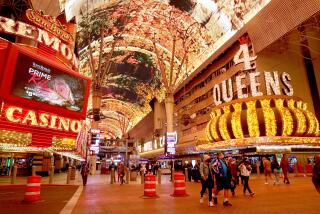Casino Boom in Suriname Brings Wins, Worries
- Share via
PARAMARIBO, Suriname — The “KA-chunk” of slot machines and the clinking of coins in metal trays fill carpeted rooms where gamblers come to nurse their hopes of riches.
These are new sounds in Suriname, where in the past few years casinos have multiplied at an explosive rate, bringing neon signs and crowds to once-quiet avenues lined with Dutch colonial buildings.
The rapid growth of casinos in Paramaribo reflects a trend sweeping South America and the Caribbean, where governments are turning to gambling as a way to boost their economies.
And it has brought fears of new social problems.
The late legislator Fred Derby crusaded against casinos in this country on the northern coast of South America, calling for tighter controls on the business.
“There is no need for casinos in the number we have,” Derby said shortly before his death a few weeks ago at age 61. “We don’t want to have a nation that believes only in gambling and doesn’t believe in hard work.”
Until 1997, Suriname allowed just one casino under partial government ownership. Since then, 10 casinos have opened and more are on the way.
While the law forbids most gambling by Surinamese, the vast majority of those inside wagering are residents. Some see gambling as a form of recreation. Others turn to casinos as a way to escape the poverty that surrounds them in a country where the average monthly income is just $150.
“When I want to relax, I go to the casinos,” said Leona Blankendaal, a 51-year-old caterer. “I forget all the problems I have.”
To the government, the casinos offer huge economic payoffs.
Although Suriname has not released tax figures, the casinos pay 50% of their earnings in taxes to the former Dutch colony. Hundreds of Surinamese also work in the gambling industry.
“We derive benefit from it, as does the country,” said Jeffrey Clague, a New Zealander who is general manager of the Suriname Palace Casino.
Despite a lack of clear evidence, some gambling opponents say the casinos have links to the drug trade. Derby and others have said that Suriname’s population of 440,000 isn’t large enough to support all the casinos and that much of their income must come from laundering drug profits.
The U.N. Drug Control Program estimates that 22 tons of cocaine are shipped through Suriname to Europe each year, and some casinos in other countries have been linked to money laundering, said Flavio Mirella at the program’s Caribbean office.
Suriname has no laws against money laundering, Mirella said.
Clague said that his casino has procedures to prevent criminal activity, but that only the government can set policies to control money laundering.
The glass doors of the Suriname Palace Casino bear a sign saying, “Firearms will not be permitted.” Its security manager, Brian O’Neill of Britain, said the casino has had few problems with crime--except for an instance last year in which two young men traded counterfeit money for coins and then won a slot-machine jackpot.
News accounts at the time said the jackpot was worth $27,500. The casino, which is backed by American and Surinamese investors, never recovered the money.
Although few tourists visit Suriname, a little-known law bars Surinamese from entering a casino unless invited in by a tourist. The law, which casino managers say dates to the 1960s, is never enforced.
Some Caribbean countries, such as St. Lucia and the Bahamas, do enforce bans on citizens entering casinos in an effort to minimize gambling addiction.
Some South American nations, including Argentina, Colombia, Peru and Uruguay, allow gambling by citizens and tourists alike, said Martin Di Meola of the Latin American Games of Hazard Assn. in Buenos Aires.
Scratch-card lotteries also are wildly popular throughout the Caribbean and Latin America, and Suriname’s new lottery has captured widespread attention since its first drawing in December.
The casinos have roulette, blackjack, poker and other high-bet games. Blankendaal, who said she goes about twice a week, prefers the slot machines, where players can gamble as little as 125 guilders (13 cents) or as much as $5.
Last year she hit a jackpot worth $4,165. She said she invested the winnings and gambles with only the interest, which she insisted amounts to as much as $200 a month.
When she has a run of bad luck, she forces herself to cut back.
“I go home, look in the mirror and curse myself,” she said. “You have to try to put the brakes on yourself.”
More to Read
Sign up for Essential California
The most important California stories and recommendations in your inbox every morning.
You may occasionally receive promotional content from the Los Angeles Times.












